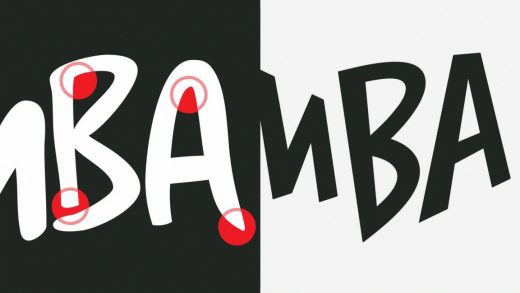How we fixed the world’s worst logo
You’d be hard-pressed to find a more dubious design title than “The World’s Worst Logo.” It’s a grim indictment of skill and taste, but it’s also a subjective conclusion, one of preference and visual intuition. The truth is, there are a lot of mind-bendingly bad logos out there, and every logo designer has a past project they’d prefer to omit from memory.
So then, how did we determine which logo, of all the logos ever logoed, was deserving of such dishonor?
How we selected the world’s worst logo
We asked Toptal designers to help us narrow the field and nominate logos that fit the following criteria:
Once all the submissions were in, judging and deliberation were under way. For this step, our staff took a long hard look at every available option before crowning an unfortunate winner.
Drumroll . . . So, what was our decision? Which logo earned the notoriety of “World’s Worst?”
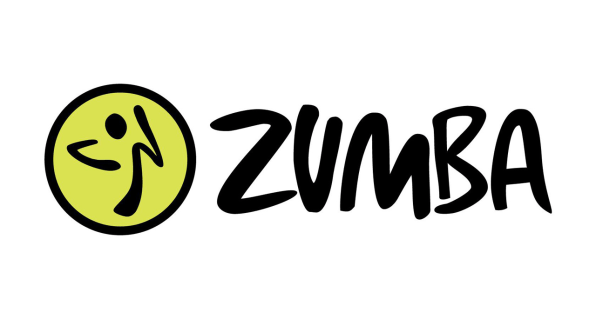
The Zumba logo!
A controversial selection, the Zumba logo met all of our criteria for badness while simultaneously seeming like a fun problem to fix. But before we get to that, let’s take a moment to introduce Zumba to any of our lead-footed readers who might be unfamiliar with this global dancercise brand.
Zumba company profile
Even though the logo needs work, there’s a lot to like about Zumba and the company’s dance-based fitness experience. Zumba classes are led by certified instructors and held in over 200,000 locations across 180 countries.
With a range of Latin and World dance styles to choose from, Zumba routines can be tailored to people of all skill levels and abilities. The company has been around since 2001 and now boasts over 15 million students attending Zumba classes. A regular schedule of concerts, cruises, dance parties, and charitable causes has helped Zumba transcend the “fitness routine” label and cultivate a loyal community of brand advocates across the world. With their “Everybody and Every Body” promise, Zumba unabashedly targets a wide demographic, and they back it up with classes that are open to everyone from infants (Zumbini) to senior citizens (Zumba Gold).
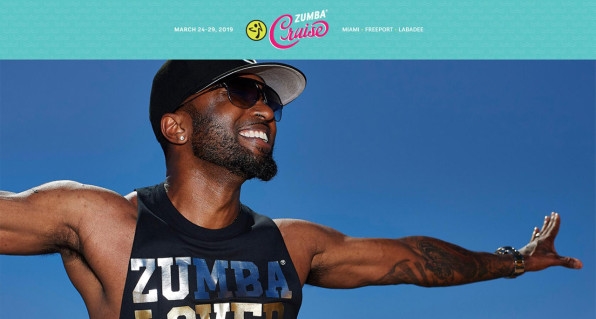
So what about that logo? With all the swagger in Zumba’s step, why does it look so darn clumsy?
Our critiques
Zumba’s website, social accounts, merchandise, and marketing materials mirror the music and movements of its classes. There’s a dynamic vibrancy that pulses through the brand, and the logo attempts to embody this with its loosely constructed letterforms and gestural “dance man” icon. Unfortunately, it falls flat on several fronts. Here’s a sampling of the design critiques that our staff offered up:
Bree Chapin: “The Zumba logo is clearly trying to convey a sense of kinetic playfulness but ends up feeling more unbalanced visually than was probably intended. The scribbly letterforms in ‘Zumba’ are fun, but . . . the circular element on the right doesn’t read clearly and is floating too far from the “Zumba” letters, which are tightly spaced by contrast.”
Micah Bowers: “My wife goes to Zumba weekly, so I’d better be careful! The problem with this logo is that it fails to be what it truly wants to be—a wildly organic expression of visual rhythm. Instead, we have a collection of awkwardly spaced letters with weird kinks and curves adjacent to a perfect circle encapsulating a stick-figure who appears to be playing a phantom upright bass.”
Cameron Chapman: “My biggest complaint about the Zumba logo is that it looks dated. Logos should be timeless, and I don’t think this one ever fit that criteria. The typography . . . is particularly awful.”
Break down the brief
Seasoned logo designers know that a well-written creative brief is a crucial part of the design process. The brief is true north, the guiding point of reference for all design decisions. Ignore it, and chaos ensues.
That said, this is a self-initiated project, and we received no formal client brief. So, we constructed our own and outlined all the problems that needed to be addressed in order to make Zumba’s logo better reflect the gusto of the brand:
Logotype
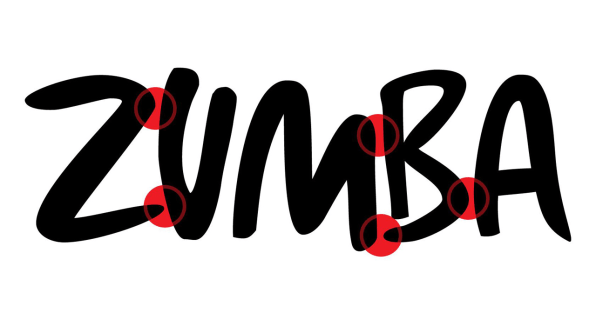
Lockup relationship
Iconography
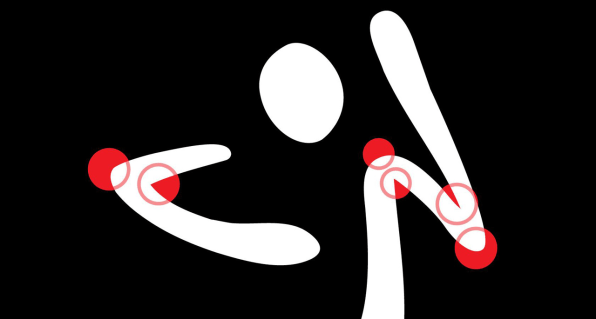
Color
Logo refresh versus redesign
If we had decided to undertake a complete logo redesign, we could have done anything we wanted, but that would have left us in a classic “apples to oranges” scenario, making it difficult to measure improvement (or lack thereof).
So, we settled on a design refresh and used the current logo as a framework to reference and refine. It was important that the updated logo be immediately recognizable to loyal Zumba instructors and students—that it be true to the original, but elevated in a way that improves the brand’s visual impact.
The logo refresh process
Unsurprisingly, the logo refresh process looks a lot like the design process.
In the section below, we discuss the design paces we put the Zumba logo through. The actual course of the investigation was a bit more detailed, but the logo refresh process isn’t complicated. Simplicity and clarity of action are key objectives.
1. Overlay sketching
The first step in our logo refresh process was a series of overlay sketches. Essentially, we examined a ghosted version of the original Zumba logo in an effort to uncover what elements of the design might be useful or problematic as we moved forward.
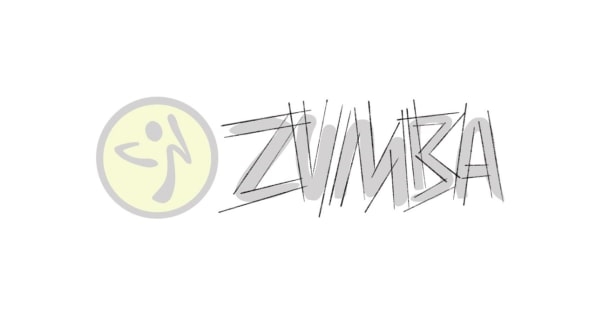
2. Concept sketching
Using the observations made from the overlay sketches, we conducted a round of concept sketches exploring various improvements. Letter spacing, style, and thickness were of special concern.
3. Group review
Once the concept sketches were completed, they were submitted to the editorial staff for a design critique.
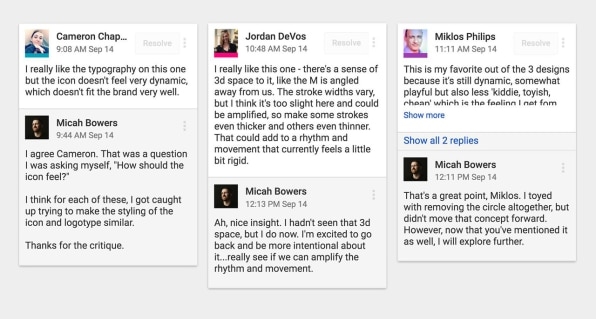
4. Refinement sketching
After getting feedback from the editorial staff, we began cleaning up details and further honing the concepts.
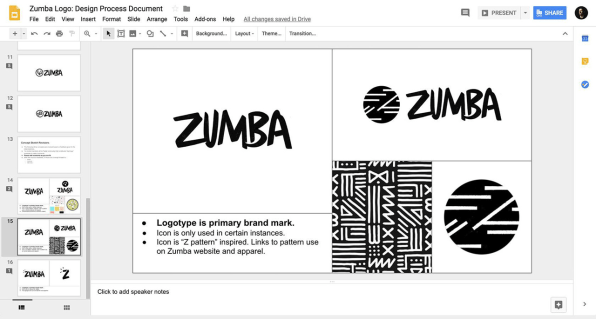
5. Community feedback and group review
With our refined sketches in hand, we returned to the Toptal community members who originally answered our call to submit bad logos and asked for their thoughts. Then, we circled back for review with the editorial staff and chose one concept to move forward.
6. Vector refinements and color
For this step, we transitioned from analog to digital and created a precise vector version of the logo in Adobe Illustrator. We also looked at updating the logo’s color.
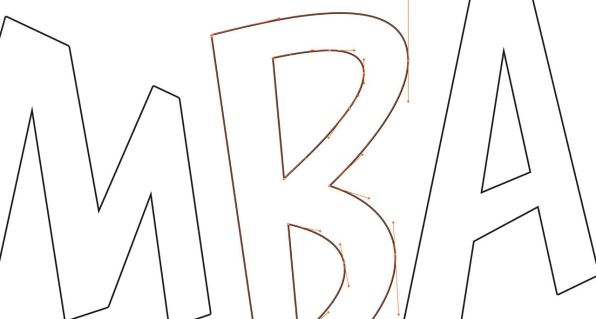
Presenting the refreshed Zumba logo
So, where did the logo refresh lead us?
Did we meet the objectives outlined in our brief?
Does the updated logo have ties to the original, or have we created an unrelated mark that will alienate loyal Zumba customers?
Ladies and gentlemen, the refreshed Zumba logo.
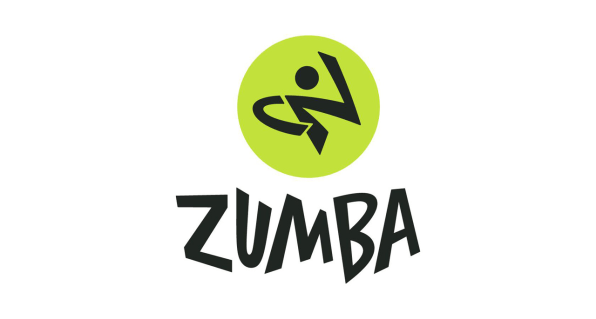
Letters, shapes, colors, symbols, and proportions have all been revitalized. No detail was left unexplored, and no design decision was deemed inconsequential.
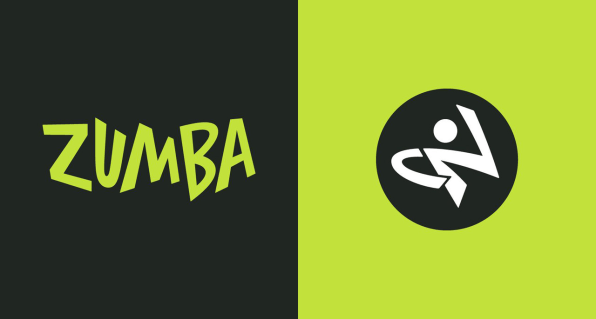
To highlight our improvements, we’ll compare the new with the old and revisit the areas of emphasis in the creative brief.
Lockup relationship improvements
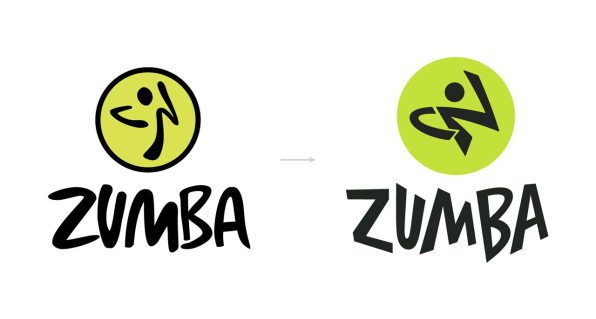
Logotype Improvements
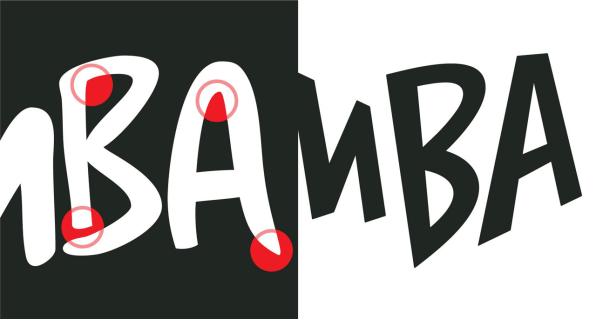
“Dance Man” Icon Improvements
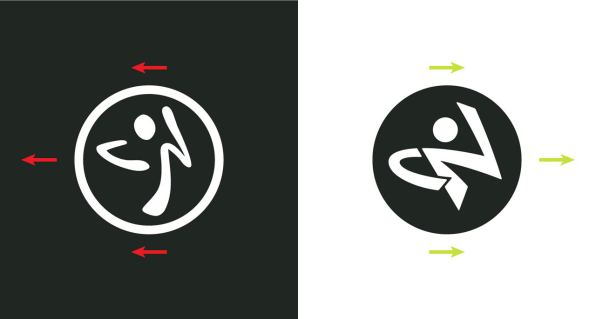
Color improvements

Final Review
When dealing with the design update of a globally recognized logo, there’s going to be controversy. Zumba is a company that helps transform lives with fitness, tight-knit community, and meaningful causes. Its followers are loyal and passionate, and it was our goal to refresh the logo in a way that would excite them. With that in mind, here’s an honest assessment of our work.
Where we failed
Research. There’s no way around it, due to limited resources (time and financial), our research was shallow. We didn’t interview Zumba students or instructors at any point in the process, and our understanding of the brand and its target market was culled from the online investigation.
Where we succeeded
We addressed the key elements outlined in the brief and delivered a logo that is formally superior yet visually related to the original.
What we learned
It’s easy to identify subpar design but much harder to fix it. As designers, we don’t have to exert much effort to find work we don’t like, but if all we ever do is dismiss, we miss learning opportunities.
It’s more productive to ask, “Why isn’t that working, and how could I fix it?” In this way, we tie our observational skills to our problem-solving abilities and open more doors to better design.
Micah Bowers is a senior designer at Toptal. Follow him on LinkedIn and Dribbble. This article was originally published on the Toptal Design Blog. Read more from Toptal:
(56)

